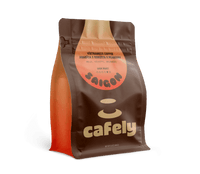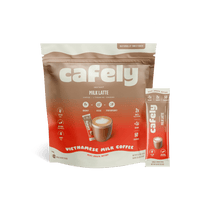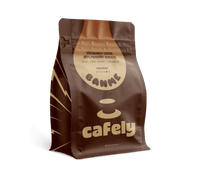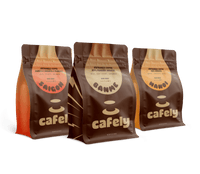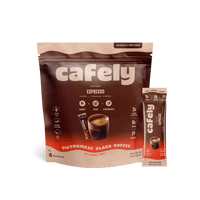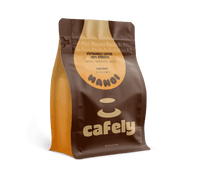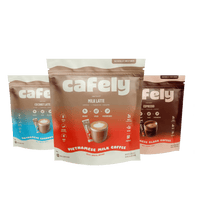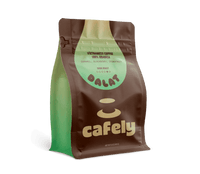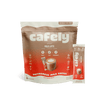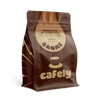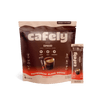If you struggle with erectile dysfunction (ED) or other sexual difficulties, you may be tired of looking for a solution.
There’s good news — research suggests coffee may be beneficial for your sexual health. How? Improvements seem to come from coffee’s caffeine content and its effects on muscle relaxation and blood flow.
We’ll explore how drinking a delicious cup of coffee may be able to help improve your sexual health, and why you may want to consider incorporating it into your daily wellness routine.
Benefits of Coffee Sexually: A Comprehensive Overview
Coffee’s many natural benefits include several cardiovascular effects, with moderate coffee consumption leading to a decrease in all-cause and cardiovascular-related mortality, hypertension, cholesterol, heart failure, and atrial fibrillation [1].
When you view coffee with these benefits in mind, it may not be too surprising that there are some sexual advantages to coffee, too.
The big three that coffee can impact include increased erectile function, improved libido, and decreased stress. Let’s break each of these down and analyze how coffee may help people with sexual health concerns.
Increased Erectile Function
Perhaps the most alluring of coffee’s benefits is increased erectile function, which is particularly exciting for patients struggling with ED.
A study has found that people who consume coffee are less likely to develop erectile dysfunction over time, with those consuming 85 to 170 mg of caffeine per day being 42% less likely to experience it [2].
To put this into context, one cup of black coffee generally has 80 to 100 mg of caffeine. With as little as one to two cups of coffee per day, consumers could experience improved erectile function.
How Coffee Improves Blood Flow
One of the ways that caffeine is thought to aid erectile function is by relaxing the arteries and muscle tissue in the penis. This allows more blood flow to occur, thereby improving erectile function [3].
This may be particularly helpful for those in whom ED is a physical problem rather than a mental one, though it is often both. Taking a holistic approach and acting on these mechanical improvements while also speaking with one's partner is a good way to tackle the issue.
Suggested: What Coffee Has the Most Caffeine? Strongest Beans & Brews
Improved Libido
Coffee may help your libido by increasing the amount of testosterone in your system. Testosterone is the male hormone responsible for regulating sexual differentiation, affecting male sex characteristics, fertility, and libido [4].
Low levels of testosterone may contribute to ED [5]. Therefore, for those suffering from ED, increasing their testosterone levels may be a viable solution.
How Coffee Increases Testosterone
There’s a chance that the amount of polyphenols in coffee can boost the amount of testosterone that your system generates. A
study did find a link between the polyphenols in pomegranate juice and an increased amount of testosterone [6], so it’s likely that the high polyphenol content of coffee could help in the same way.
In a 2010 clinical trial, researchers found that men who consumed caffeine experienced improved athletic performance and increased levels of testosterone than those who didn't [7].
Understanding the important role that testosterone plays in male sexual performance means that by increasing your caffeine intake and, subsequently, your levels of testosterone, you may be able to improve libido.
>> Try the Strongest Coffee for Improved Libido Here
Decreased Stress & Anxiety
One of the primary drivers of ED is stress and anxiety. In fact, men with anxiety disorders are at a higher risk of developing erectile dysfunction [8].
When the body is stressed, a person may find it difficult to perform sexually, particularly teenagers and young men. Those with an increased stress response (typically driven by heightened cortisol levels) may find it more difficult to get and maintain an erection.
How Coffee Can Reduce Stress Response
Coffee intake may lead to reduced stress responses in the body. Some research shows that regular caffeine intake may amplify alertness, elevate mood, and increase hypothalamic-pituitary-adrenocortical axis (HPAC) activation [9].
The HPAC regulates digestion, immune responses, mood, emotions, and sexual activity, and additional activation may help reduce the risk for depression, anxiety, and metabolic disorders.
Coffee's impact on HPAC activation may allow those suffering from ED to find a calmer state of mind, and thereby not get "in their own head" while engaging in sex.
In turn, this improved regulation of key functions in the body during times of stress may help people achieve and maintain an erection.
Suggested: Is It Bad to Drink Coffee Every Day?
Beyond Caffeine: Other Compounds in Coffee That Benefit Sexual Health

Coffee is a very complicated substance, and it contains many compounds that interact with your body in different ways. For instance, coffee contains a huge number of antioxidants, which can protect blood vessels in your system and lead to improved sexual health.
Here, we will talk about some great things to keep an eye out for — these ensure your coffee is full of beneficial nutrients. Then, we’ll touch on how lifestyle factors can work with coffee to improve your overall sexual health.
1. Coffee Source & Organic Certification
The origin of your coffee beans is important, both for flavor and the potential health benefits it may have. Coffee’s health benefits and flavor are significantly impacted by the region in which it is grown. Factors like climate, altitude, and soil composition all translate to the coffee in your morning cup.
To find the coffee with the most complex flavor and potent benefits, look for beans that are grown in tropical climates with volcanic soil, like Vietnam. For example, Cafely’s Vietnamese Coffee Collection offers a range of options to suit different health needs and taste preferences.
Additionally, coffee grown with organic processes preserves more of the natural compounds, ensuring that each time you drink coffee, you're experiencing all the potential sexual health benefits without chemicals or pesticides.
Suggested: The Best Organic Coffee — Healthiest Brands to Check Out
2. Fair Trade & Single Origin
Whenever shopping for coffee, always opt for a Fair Trade option. This certification means that all coffee farmers and producers are paid an honest, fair wage for their hard work and guarantees that the coffee was produced with sustainable practices.
Fair Trade also supports community development initiatives where the coffee is grown and processed, addresses ethical concerns for workers' rights, and maintains full transparency throughout the entire supply chain.
To take things a step further, single-origin coffee only uses coffee from a specific region, providing consistent and original flavor profiles that you can’t get from multi-origin coffees. If you find that a particular single-origin coffee is especially effective for your sexual health, you can depend on its quality over time, giving you increased confidence.
3. Coffee Beans
Robusta, arabica, and peaberry coffees have different flavors, profiles, caffeine content, and effects.
When buying for the highest levels of caffeine and nutrient content, look for peaberry robusta beans. Robusta coffee beans are known to have around twice as much caffeine as arabica beans. Plus, peaberries are thought to contain a higher concentration of nutrients since they are the only bean that grows on its own inside a coffee cherry; typical cherries contain two coffee beans.
The intense combination of caffeine and nutrients in peaberry robusta beans may lead to increased vigor and mental confidence, which easily translates to improved sexual health.
4. Roast Level
While coffee’s flavor is greatly impacted by its source, type of bean, and processing method, the way it is roasted can completely change the coffee’s flavor and health profile.
During the roasting process, certain nutrients and antioxidants are lost while other antioxidant compounds are formed. A lighter roast may have more of a certain nutrient than a dark roast, but the longer roasting time and higher temperatures in dark roasts may lead to higher overall antioxidant levels [9].
If improving your sexual health is a main factor in your coffee purchase, consider choosing one of Cafely’s Dark Roast Coffees for the best results.
5. Tested for Safety
As with any natural product, when shipped internationally, grain-like crops can be at risk of mold growth. This is also true for coffee and can result in the presence of mycotoxins, which are dangerous for your health.
To avoid toxic chemicals and other substances, and always drink clean, safe, mold-free coffee, look for a roaster that carries out regular safety tests.
Lifestyle Changes: Using Coffee as a Tool to Combat ED
Erectile dysfunction has several contributing factors, including age, smoking, and alcohol or drug use. For many people, the best way to combat ED is to alter these contributing factors over which you have control — drinking less alcohol, for instance, could be a good place to start.
Coffee can be a very useful tool as part of a holistic approach to tackling ED, particularly in an effort to quit smoking and lose weight. Research shows that both of these changes can significantly improve your overall well-being and reduce erectile dysfunction symptoms [10, 11].
Coffee & Quitting Smoking

Stopping smoking can be a very difficult task and is an addiction that many people face. While coffee is not a cure for an addiction to smoking, some people find that it can help distract you when you have the urge to smoke.
The physical ritual of making coffee can be very soothing, and the tactile feedback from a comforting mug containing hot coffee can replace old habits.
You may also feel the benefit in other sensory ways. For instance, while the strong aroma of black coffee is very different from that of cigarettes, it may be potent enough to divert your attention temporarily.
Furthermore, both nicotine and caffeine are powerful stimulants, so the boost you experience from a cup of coffee may replicate a nicotine hit enough to reduce withdrawal symptoms.
>> Strongest Coffees to Help You Quit Smoking
Coffee, Exercise, & Weight Loss
Coffee is a great tool to add to an exercise routine; many bodybuilders and gym enthusiasts have strong coffee as a pre-workout ritual. The boost from coffee can be a good way to start a workout with plenty of enthusiasm and energy.
Beyond that, coffee has also shown some promise for weight loss in general. While, of course, caffeine can give you a boost that might spur you on at the gym, caffeine also raises your resting heart rate, increases the rate at which fat cells are mobilized from fat tissue, and can even increase your metabolic rate [12, 13, 14].
These different beneficial effects can all work together to help you start your weight loss journey. You may not see immediate results, as losing weight takes time, but progress in the right direction is certainly a win.
FAQs: Benefits of Coffee Sexually
Now that we’ve done a deep dive into the science of how coffee may have benefits sexually, let’s answer some key FAQs.
1. Does Coffee Enhance Sexual Performance?
Caffeine’s stimulant properties can help some people with their sexual performance, largely due to an increase in energy and blood flow. For instance, a 2015 study found that there’s a reduced risk of erectile dysfunction among those who consume a moderate amount of coffee [2].
2. What Can I Drink for a Full Erection?
Coffee has a powerful vasodilatory effect, which means that you can experience more blood flow throughout your whole body. This may help to achieve a full erection. Also, testosterone has been associated with a reduced risk of ED.
3. When Should I Drink Coffee for Performance?
Caffeine doesn't necessarily kick in right away, so the best time to drink coffee for performance is around 30 to 45 minutes before sexual activity. It's important to note that caffeine has a half-life of around six hours; however, so drinking a cup in the evening may mean you don't get any sleep that night.
4. Does Coffee Increase Climax?
There’s very little research around this claim, but there may be indirect benefits. Coffee is known to increase blood flow and energy levels, and this may lead to increased climax in some individuals.
5. Does Coffee Act Like Viagra?
No, coffee doesn't act like Viagra. Coffee has a mild vasodilatory effect, which can aid blood flow, whereas Viagra is a PDE5 inhibitor drug, meaning that it blocks that specific enzyme in order to relax blood vessels. Coffee is not a replacement for prescribed ED medication.
6. Is Coffee Good for Your Sperm?
Coffee doesn’t have much of an impact either way on sperm. A 2017 review found that caffeine from coffee doesn’t impact reproductive health, whereas caffeine in soda may [15]. However, it’s crucial to point out that there’s not a lot of specialized research on this topic, so we don’t know how much of an impact coffee may have. The things with the biggest impact are diet and lifestyle — through losing weight and exercising, reproductive health often improves.
7. How Much Coffee Is Too Much Per Day?
The tolerance of coffee varies from person to person, but generally, a good limit is 400 mg of caffeine per day, as the FDA recommends. If you exceed that limit, you can start to feel anxious and jittery, which will likely have a negative impact on sexual function.
8. What Are Three Disadvantages of Coffee?
Regarding sexual health, three key disadvantages are: anxiety from overconsumption impacting performance, sleep disruption causing hormonal imbalances, and dehydration impacting overall erectile and sexual function.
9. Does Coffee Increase Stamina?
Caffeine may help increase stamina by aiding endurance and alertness, which may help maintain sexual stamina, too. However, you will typically only notice stamina as an issue when you run out of it — this perceived stamina increase and your actual stamina increase may differ. The best way to increase stamina is to improve your health, which typically leads to a general rise in energy levels.
10. How Does Coffee Affect Women’s Sexual Health?
Coffee (and the caffeine within it) can impact women’s sexual health through increased blood flow, similarly to how caffeine impacts men’s sexual health. Increased blood flow through the body and brain may help someone to become aroused more easily. One particular study from 2023 found that 300 mg of caffeine helped female participants experiencing antidepressant-induced arousal difficulties; the participants became aroused more easily [16].
References
- Liu, J., Sui, X., Lavie, C. J., Hebert, J. R., Earnest, C. P., Zhang, J., & Blair, S. N. (2013, October). Association of coffee consumption with all-cause and cardiovascular disease mortality. In Mayo clinic proceedings (Vol. 88, No. 10, pp. 1066-1074). Elsevier.
- Lopez, D. S., Wang, R., Tsilidis, K. K., Zhu, H., Daniel, C. R., Sinha, A., & Canfield, S. (2015). Role of Caffeine Intake on Erectile Dysfunction in US Men: Results from NHANES 2001-2004. PLOS ONE, 10(4), e0123547.
- Yang, R., Wang, J., Chen, Y., Sun, Z., Wang, R., & Dai, Y. (2008). Effect of caffeine on erectile function via up‐regulating cavernous cyclic guanosine monophosphate in diabetic rats. Journal of andrology, 29(5), 586-591.
- Nassar, G. N., & Leslie, S. W. (2018). Physiology, testosterone.
- Rastrelli, G., Corona, G., & Maggi, M. (2020). Both comorbidity burden and low testosterone can explain symptoms and signs of testosterone deficiency in men consulting for sexual dysfunction. Asian journal of andrology, 22(3), 265-273.
- Ammar, A., MounaTurki, Trabelsi, K., Bragazzi, N. L., Boukhris, O., Bouaziz, M., ... & Hoekelmann, A. (2020). Effects of natural polyphenol-rich pomegranate juice on the acute and delayed response of Homocysteine and steroidal hormones following weightlifting exercises: a double-blind, placebo-controlled trial. Journal of the International Society of Sports Nutrition, 17, 1-13.
- Paton, C. D., Lowe, T., & Irvine, A. (2010). Caffeinated chewing gum increases repeated sprint performance and augments increases in testosterone in competitive cyclists. European journal of applied physiology, 110, 1243-1250.
- Velurajah, R., Brunckhorst, O., Waqar, M., McMullen, I., & Ahmed, K. (2022). Erectile dysfunction in patients with anxiety disorders: a systematic review. International journal of impotence research, 34(2), 177-186.
- Lovallo, W. R., Whitsett, T. L., al’Absi, M., Sung, B. H., Vincent, A. S., & Wilson, M. F. (2005). Caffeine stimulation of cortisol secretion across the waking hours in relation to caffeine intake levels. Biopsychosocial Science and Medicine, 67(5), 734-739.
- Dybkowska, E., Sadowska, A., Rakowska, R., Debowska, M., Swiderski, F., & Swiader, K. (2017). Assessing polyphenols content and antioxidant activity in coffee beans according to origin and the degree of roasting. Roczniki Państwowego Zakładu Higieny, 68(4).
- Evans, M. F. (2005). Lose weight to lose erectile dysfunction. Canadian family physician, 51(1), 47.
- Pourmand, G., Alidaee, M. R., Rasuli, S., Maleki, A., & Mehrsai, A. (2004). Do cigarette smokers with erectile dysfunction benefit from stopping?: a prospective study. BJU international, 94(9), 1310-1313.
- Kim, TW., Shin, YO., Lee, JB. et al. Effect of caffeine on the metabolic responses of lipolysis and activated sweat gland density in human during physical activity. Food Sci Biotechnol 19, 1077–1081 (2010).
- Dulloo, A. G., Geissler, C. A., Horton, T., Collins, A., & Miller, D. S. (1989). Normal caffeine consumption: influence on thermogenesis and daily energy expenditure in lean and postobese human volunteers. The American journal of clinical nutrition, 49(1), 44–50.
- Ricci, E., Viganò, P., Cipriani, S., Somigliana, E., Chiaffarino, F., Bulfoni, A., & Parazzini, F. (2017). Coffee and caffeine intake and male infertility: A systematic review. Nutrition Journal, 16, 37.
- Mcmahon, L., & Meston, C. (2023). (023) The Acute Effect of Caffeine on Genital Arousal in Women: A Pilot Study. The Journal of Sexual Medicine, 20(Supplement_2).
